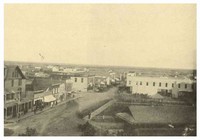History
Before the pioneers came to the Carrington area, the region was important to Native American People. Hawk's Nest Ridge, a peak located in a low range of hills southwest of the community, is an ancient sacred place. Today you can hike through a 100-acre nature park located at the site. From the top of the ridge, you will enjoy a panoramic view of the prairie. The area's Native American and pioneer history are featured in collection of artifacts at the Foster County Museum and the Chieftain Conference Center in Carrington.
Vast seas of waving prairie grass interrupted only by wild roses, crocuses, and game - this describes the Carrington area prior to the 1880s. Undaunted by frigid winters and the lack of wood for fuel or construction, resourceful homesteaders utilized sod to construct the first shelters for themselves and their livestock.
Like most North Dakota communities, Carrington can trace its development to the arrival of the railroad. By 1882 the Northern Pacific line ran through the unnamed prairie settlement.
The railroad provided access to goods such as lumber and soon wooden homes and stores created a modest skyline. With growth came a sense of corporate identity and the townspeople decided to name the community after one of the local business leaders.
In 1883, Foster County was organized with Carrington and New Rockford competing for designation as the county seat. Ultimately, the county was divided in two and New Rockford became the county seat for Eddy County while Carrington became the county seat of Foster County.
Agriculture formed the basis for Carrington's early economy. Along with businesses such as a lumberyard and grain elevator came churches and a school. The first Carrington High School graduates received diplomas in 1902. A municipal electric plant began in 1903.
Today, Carrington is the center of an important corridor of agribusiness. It is home to state of-the-art Dakota Growers Pasta Company, which markets premium quality pasta worldwide made from the finest durum wheat grown in this region. Many other important agribusiness are also headquartered in Carrington.
These companies have taken root from the rich agricultural heritage that has made Carrington the safe and wholesome place it is. There is no better place to raise a family; there is no place that can match the sense of belonging that one can find here. Our ancestors discovered it, and may of us are now rediscovering it. Carrington is indeed that special place that you'll want to visit or call home.

Historical Carrington, ND
